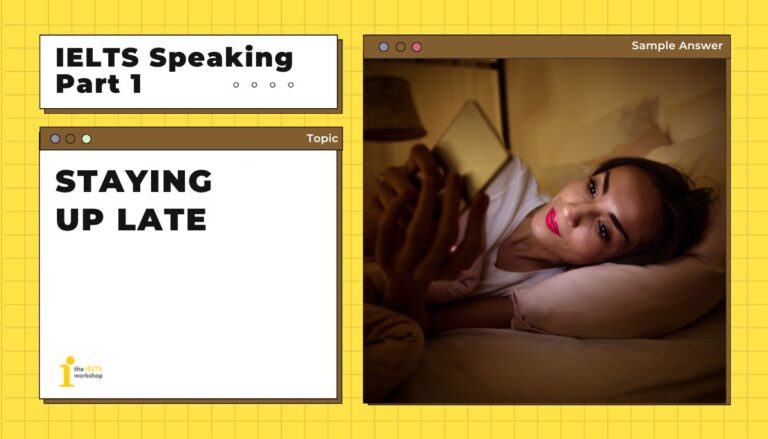Dưới đây là bài mẫu của cô Thủy Ngô (giảng viên tại The IELTS Workshop) và cô Mỹ Linh (giảng viên tại The IELTS Workshop TP. HCM) cho chủ đề Staying up late trong Speaking Part 1. Cùng tham khảo sample, từ vựng theo chủ đề và một vài cách diễn đạt ghi điểm nhé.
Câu hỏi chủ đề IELTS Speaking Part 1 Staying Up Late
1. How often do you stay up late?
2. Did you stay up late when you were a kid?
3. What do you do when you stay up late?
4. What does it feel like the next morning when you stay up late?
1. How often do you stay up late?
Sample 1: I’m definitely not a night owl. I rarely stay up past midnight. I’m not wide awake and can not concentrate on studying or working.
- night owl: cú đêm (người hay thức đêm)
- wide awake: tỉnh táo
Sample 2: I usually go to bed at around 2 or even 3 AM. It’s not that I work hard or do anything either serious or important, it is only because of social media. I know that this is so unhealthy, but I can’t help it. Maybe I need to find ways to stop scrolling Tiktok at night.
- stop scrolling Tiktok: Dừng lướt Tiktok
2. Did you stay up late when you were a kid?
Hardly ever, because when I was a kid, I had a lot of me-time during the day, so I didn’t have to sacrifice my sleep time to do something more important. I was totally an early bird.
- me-time: thời gian dành cho bản thân
- early bird: người hay dậy sớm
3. What do you do when you stay up late?
Sample 1: Well, normally it’ll be because I’m working on my projects or cramming for my exams . But I also speak to my friends on social networking sites, for example, Facebook or Zalo.
- cram for: học nhồi
- social networking site: mạng xã hội
Sample 2: As I said earlier, social media apps are the main culprit. It is a fact that platforms with short videos are designed to capture our attention immediately and become increasingly addictive. At first, you think that you might spend around 5 or 10 minutes watching those videos. Afterwards, it turns out that you have wasted 2 or even 3 hours of your day. Then, you feel guilty and have no motivation to do anything. The most important thing is that, I believe, not only me but also lots of young people out there are struggling with this problem.
- the main culprit: Thủ phạm chính
- capture our attention immediately: Thu hút sự chú ý của chúng ta ngay lập tức
- become increasingly addictive: Ngày càng gây nghiện
- It turns out that: Hóa ra là
- struggle with: Chật vật với
4. What does it feel like the next morning when you stay up late?
Sample 1: Well, when I don’t have enough sleep, I often feel exhausted and find it difficult to concentrate on my work or study the next morning. It’s definitely not a great feeling, so I usually regret what I have done and I’ve told myself to give this bad habit up.
- exhausted: mệt lử
- give a bad habit up: từ bỏ 1 thói quen xấu
Sample 2: In the past, I used to be quite a “morning person” since I had to attend classes everyday, so staying up too late at night would be a nightmare for me. However, saying goodbye to the student’s life and becoming an employee made me gradually become an official “night owl” now. That is the reason why I feel completely fine in this situation, as long as I get an 8-hour sleep, which means that I have to wake up late the next morning.
- nightmare: Ác mộng
- night owl: Cú đêm
Bài mẫu bởi cô Thủy Ngô và cô Mỹ Linh – The IELTS Workshop
Trên đây là sample cho Topic: Staying up late trong IELTS Speaking Part 1. Ngoài ra, bạn cũng có thể truy cập Kho bài mẫu Speaking Part 1 của TIW để tham khảo nhiều bài mẫu cho các chủ đề IELTS khác.
Bạn có thể làm bài Kiểm tra trình độ tiếng Anh miễn phí để xác định trình độ của bản thân, từ đó đề ra lộ trình ôn luyện hiệu quả.
Ngoài ra, bạn hãy tham khảo phương pháp xây dựng câu trả lời ngắn gọn cho bài thi IELTS Speaking Part 1 tại khóa học Pre-Senior của The IELTS Workshop nhé.









